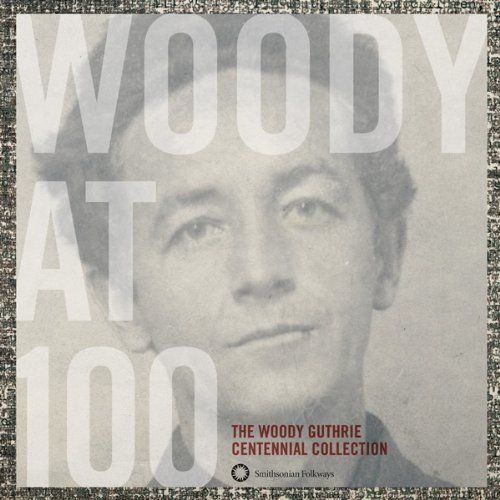
Woody Guthrie
Woody at 100: The Woody Guthrie Centennial
Release Date: Jul 10, 2012
Genre(s): Folk
Record label: Smithsonian Folkways Recordings
Music Critic Score
How the Music Critic Score works
Buy Woody at 100: The Woody Guthrie Centennial from Amazon
Album Review: Woody at 100: The Woody Guthrie Centennial by Woody Guthrie
Fantastic, Based on 7 Critics
Based on rating 10/10
July 14, 2012 marks the hundredth anniversary of Woody Guthrie’s birth—a date that seems remarkable not because it’s so distant, but because it’s so recent. Others born that year include John Cheever, Julia Child, and Michelangelo Antonioni, all artists whose work helped define a decade as recent as the 1960s. But Guthrie’s work is tied eternally to the Depression and Dust Bowl of the 1930s.
Based on rating 5/5
This sumptuous birthday celebration of America's greatest folk singer is really a present to us: two CDs of his greatest songs and recordings, mostly from the mid-1940s, and a disc of illuminating rarities, including what is thought to be Guthrie's first studio session in 1939. Woody at 100 also comes rife with reminders of how much our current dire straits resemble the Depression-and-Dust Bowl-ravaged America in Guthrie's songs: the migrant poor harvesting bounty for the rich man's table in "Pastures of Plenty"; the line in "Pretty Boy Floyd" about the crook who robs you "with a fountain pen. " Guthrie was not born into struggle; his Oklahoma family prospered in the Twenties oil boom.
Based on rating A-
This excellent three-CD overview of the hugely influential folksinger’s career covers much of the obvious ground (”Pastures of Plenty,” ”The Grand Coulee Dam,” two versions of ”This Land Is Your Land”), then explores some less-visited hinterlands on its third disc. These include Guthrie’s 1944 appearance on the BBC radio show Children’s Hour, during which he warps innumerable kids’ minds by performing the outlaw ballad ”Stagger Lee” and is interviewed by a woman with the toniest voice this side of a royal wedding. A- Best Tracks:This Land Is Your LandPretty Boy Floyd .
Based on rating 8.5/10
Okemah, Okla. 's most famous export, that scrawny kid born Woodrow Wilson Guthrie, might have turned 100 this July if Huntington's disease hadn't wasted him back in 1967. It's strange to consider even the vague possibility of a centenarian Woody Guthrie living among us; for starters, he always seemed old even when he was young, wizened and weary before his time, by both circumstance and his own design.
Based on rating 8/10
Woody Guthrie defined an era and culture in transition in his Dust Bowl ballads, his outlaw tales, his work and labor songs, antiwar songs, children's songs, political songs, and a host of love songs and songs that touched on philosophy, geography, and the hard work of living day to day in an emerging industrial world. He was kind of a maverick troubadour beat journalist, writing and drawing constantly, and new poems, writings, drawings, and even previously unknown songs and recordings have kept turning up even a decade into the 21st century. Smithsonian Folkways, to honor the centennial year of Guthrie's birth in 2012, has issued this three-disc set of Guthrie's songs housed in a beautiful 150-page hard-cover coffee-table book full of essays, letters, text, photos, drawings, and other Guthrie ephemera, including rare, previously unreleased recordings of Guthrie's earliest material, made in 1937 when he was working for a radio station in Los Angeles.
Opinion: Fantastic
My introduction to Woody Guthrie came early, singing "This Land is Your Land" in elementary school, and it was my first lesson in how his music is one of the strongest threads tying North Americans together. From there, Woody's songs became a constant presence in my life, and as with many other people, it grew into a source of truth beyond the reach of music business corruption. Although Woody's iconic status is partly due to his influence on a young Bob Dylan, since his death in 1967, Guthrie's legacy has likewise been a crucial touchstone for the subsequent generation of Americana artists and protest singers.
Opinion: Very Good
Oklahoma's quiet prophet, the godfather of protest folk, would've turned 100 this year, so it's hard not to consider all the magnanimous, demigod glamour that Woody Guthrie might have enjoyed today if Huntington's disease hadn't sapped him dry back in 1967. Woody at 100 doesn't aim to be the definitive, exhaustive guide to Guthrie's singular legacy; it's far too egalitarian for such ambitions. Instead, the Smithsonian's latest rendezvous culls from a vast catalog that which is most essential.
'Woody at 100: The Woody Guthrie Centennial'
is available now

